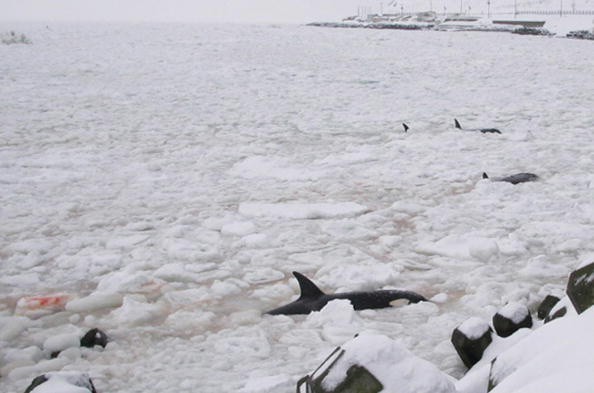On Tuesday, a pod of 10 orcas was trapped by drifting sea ice on Japan's main northern island of Hokkaido.
Japanese public broadcaster NHK told the local officials from Rausu, a village on the island's east, that the fate of the killer whales is still unknown.

Video footage aired by the public broadcaster NHK showed at least ten orcas poking out of a tiny opening in the surface of the water about 1 km off the coast of Rausu on the Shiretoko peninsula, a Unesco world heritage site known for its abundant wildlife.
A fisherman notified the coast guard, but the town said the thick ice prevented them from freeing the mammals. "We have no choice but to wait for the ice to break up and for them to escape that way," a Rausu official told NHK.
Seiichiro Tsuchiya, a marine life expert who filmed the affected creatures using a drone, told the broadcaster he discovered the pod while studying the sea lion population in the area.
He shared that he saw about 13 killer whales with their heads sticking out of a hole in the ice. He continued that they seemed struggling to breathe, and it looked like they included three or four calves.
The largest cetaceans can stay underwater for extended periods. However, killer whales typically resurface for only several minutes.
A drift of ice covers the sea along the eastern coast of Hokkaido, Japan's northernmost main island, every winter. The rising sea temperatures brought on by the climate crisis have resulted in a decline in ice in recent years.
Furthermore, the officials said that the ice sheets had barely moved this week due to the absence of wind.
Japan Whale Hunting
International media was shocked to see a video that showed the last horrific 20 minutes of a minke whale's life at the hands of a Japanese fisherman.
The activists claimed that the video showing the whale slowly drowning after getting entangled in their nets has only brought attention to a completely legal gap that is used to kill dozens of whales every year.
Mark Simmonds, senior marine scientist at Humane Society International (HSI), said after the whale's death that this is neither an exceptional nor unexpected occurrence. He added that what is exceptional is that the whole process was witnessed and filmed for the world to see.
The young mammal's passing has once again highlighted the gaping chasm between whale hunting in Japan and the rest of the world. The activists view whale hunting as a cruel and preventable death, but fishermen view it as a gift from the sea.
Like many other countries, whale hunting has a long and rich history in Japan. Whale meat became a staple of the Japanese table as the country struggled to feed its people after World War II.
Related Article : Offshore Wind Farms Don't Kill Whales Despite What Some Politicans' Say








